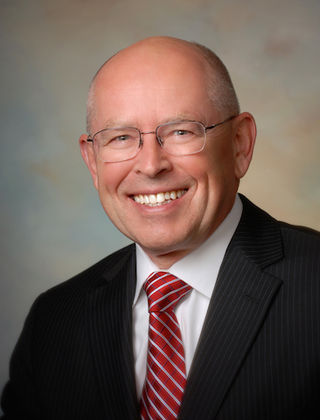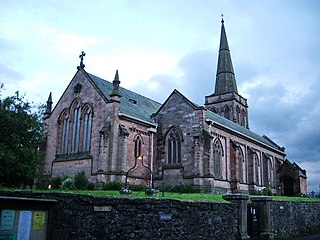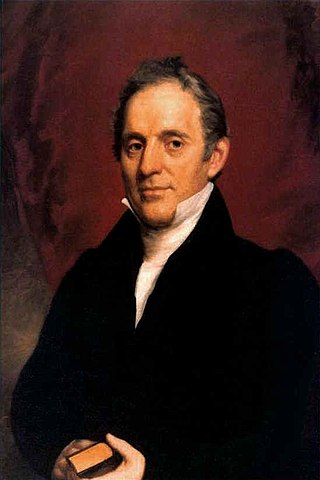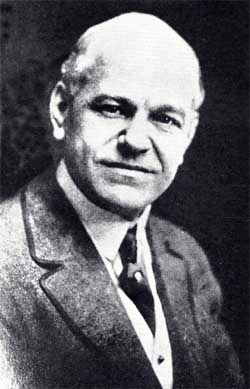An altar call is a tradition in some Christian churches in which those who wish to make a new spiritual commitment to Jesus Christ are invited to come forward publicly. It is so named because the supplicants gather at the altar located at the front of the church building. Most altar calls occur at the end of an evangelical address. [1]
Altar calls are a recent historic phenomenon beginning in the 1830s in America. During these, people approached the chancel rails, anxious seat, or mourner's bench to pray. [2] One of the most famous 19th century revivalists, Charles Grandison Finney, "popularized the idea of the 'altar call' in order to sign up his converts for the abolition movement". [3] In many Churches of the Wesleyan-Arminian theology, the altar call, in addition to being an invitation for people to experience the New Birth, is also often used to implore believers to experience the second work of grace, known as entire sanctification. [4] Notable examples in history of using altar calls include Billy Sunday and D. L. Moody. [2]
Rick Warren notes that the Bible does not refer to any similar practice. [5] Some in the Reformed Churches object to the use of the altar call for a variety of reasons. It is argued that the practice is intimidating and therefore creates an unnecessary and artificial barrier to those who would become Christians but are then unwilling to make an immediate public profession under the gaze of an assembly. [5] Others object in that they may mislead people into confusing outward conduct with spiritual change. In doing so, they argue, altar calls may actually give people false assurance about their salvation. [6] In addition, Carey Hardy argues that they change "the essence of the gospel", create believers with false professions of faith, and do not "follow the biblical method for public identification". [7]

Arminianism is a movement of Protestantism initiated in the early 17th century, based on the theological ideas of the Dutch Reformed theologian Jacobus Arminius and his historic supporters known as Remonstrants. Dutch Arminianism was originally articulated in the Remonstrance (1610), a theological statement submitted to the States General of the Netherlands. This expressed an attempt to moderate the doctrines of Calvinism related to its interpretation of predestination.
To be born again, or to experience the new birth, is a phrase, particularly in evangelicalism, that refers to a "spiritual rebirth", or a regeneration of the human spirit. In contrast to one's physical birth, being "born again" is distinctly and separately caused by the operation of the Holy Spirit, and it is not caused by baptism in water. It is a core doctrine of the denominations of the Anabaptist, Moravian, Methodist, Baptist, Plymouth Brethren and Pentecostal Churches along with all other evangelical Christian denominations. All of these Churches strongly believe Jesus's words in the Gospels: "You must be born again before you can see, or enter, the Kingdom of Heaven". Their doctrines also mandate that to be both "born again" and "saved", one must have a personal and intimate relationship with Jesus Christ.

Perseverance of the saints is a Christian teaching that asserts that once a person is truly "born of God" or "regenerated" by the indwelling of the Holy Spirit, they will continue doing good works and believing in God until the end of their life.

In Christianity, evangelism or witnessing is the act of preaching the gospel with the intention of sharing the message and teachings of Jesus Christ. It is sometimes associated with Christian missions.

Charles Grandison Finney was an American Presbyterian minister and leader in the Second Great Awakening in the United States. He has been called the "Father of Old Revivalism." Finney rejected much of traditional Reformed theology.

Open-air preaching, street preaching, or public preaching is the act of evangelizing a religious faith in public places. It is an ancient method of proselytizing a religious or social message and has been used by many cultures and religious traditions, but today it is usually associated with evangelical Protestant Christianity. Supporters of this approach note that both Jesus and many of the Old Testament prophets often preached about God in public places. It is one of the oldest approaches to evangelism.

Wayne A. Grudem is a New Testament scholar turned theologian, seminary professor, and author. He co-founded the Council on Biblical Manhood and Womanhood and served as the general editor of the ESV Study Bible.
Ronald James Sider, was a Canadian-born American theologian and social activist. He was the founder of Evangelicals for Social Action, a think-tank which seeks to develop biblical solutions to social and economic problems through incubating programs that operate at the intersection of faith and social justice.

The Higher Life movement, also known as deeper Christian life, the Keswick movement or Keswickianism, is a Protestant theological tradition within evangelical Christianity that espouses a distinct teaching on the doctrine of entire sanctification.
Donald Arthur Carson is an evangelical biblical scholar. He is a Distinguished Emeritus Professor of New Testament at Trinity Evangelical Divinity School and president and co-founder of the Gospel Coalition. He has written or edited about sixty books and served as president of the Evangelical Theological Society in 2022.

Jennings Ligon Duncan III is an American Presbyterian scholar and pastor.

Mark E. Dever is a theologian and the senior pastor of the Capitol Hill Baptist Church in Washington, D.C., and the president of 9Marks, a Christian ministry he co-founded "in an effort to build biblically faithful churches in America. Dever also taught for the faculty of Divinity at the University of Cambridge and also served for two years as an associate pastor of Eden Baptist Church in Cambridge."

Ben Witherington III is an American Wesleyan-Arminian New Testament scholar. Witherington is Professor of New Testament Interpretation at Asbury Theological Seminary, a Wesleyan-Holiness seminary in Wilmore, Kentucky, and an ordained pastor in the United Methodist Church.
Christians have used many different approaches to spread Christianity via the practice of evangelism. Christianity began with only a few different evangelistic approaches, but over the years, many different forms of evangelism have been employed by various groups to spread their faith. Many of these forms of evangelism are often employed in only certain parts of the world by Christians in different geographical areas. In particular, most new approaches to evangelism today have arisen out of Europe or the United States, especially when new technologies are used for the effort of evangelism.

Asahel Nettleton was an American theologian and Evangelist from Connecticut who was highly influential during the Second Great Awakening. The number of people converted to Christianity as a result of his ministry was estimated by one biographer at 30,000. He participated in the New Lebanon Conference in 1827, during which he and Lyman Beecher opposed the teachings of Charles Grandison Finney.
Regeneration, while sometimes perceived to be a step in the ordo salutis, is generally understood in Christian theology to be the objective work of God in a believer's life. Spiritually, it means that God brings a person to new life from a previous state of separation from God and subjection to the decay of death. Thus, in Lutheran and Roman Catholic theology, it generally means that which takes place during baptism. In Calvinism and Arminian theology, baptism is recognized as an outward sign of an inward reality which is to follow regeneration as a sign of obedience to the New Testament; as such, the Methodist Churches teach that regeneration occurs during the new birth.
The New Lebanon Conference of ministers was a meeting held in July 1827, in New Lebanon, New York, to resolve disputes in the Presbyterian churches concerning the so-called New Measures for evangelism instituted and popularized primarily by Charles Grandison Finney. "The organizers of the meeting appear to have been Nathan Beman and Lyman Beecher." The week-long series of meetings did not achieve unity among those who attended, but it did clarify the differences. Heman Humphrey, William R. Weeks, and some others represented the traditional side which opposed the New Measures while Finney was present with some supporters from the other side.
Repentance is a stage in Christian salvation where the believer acknowledges and turns away from sin. As a distinct stage in the ordo salutis its position is disputed, with some theological traditions arguing it occurs prior to faith and the Reformed theological tradition arguing it occurs after faith. In Catholic theology, Lutheran theology, Orthodox theology and Anglican theology, repentance plays a key role in Confession and Absolution.
Craig S. Keener is a North American academic, Biblical scholar and professor of New Testament at Asbury Theological Seminary.

William Edward Biederwolf was an American Presbyterian evangelist.
I want to remind you that Jesus never said you had to walk from Point A to Point B in a church to become a believer. In fact they gave no come forward, down the aisle altar calls for the first three hundred years of the church because they didn't even have church buildings for the first three hundred years of the church, so there obviously weren't any aisles to walk down. The come forward invitation is a method that's only about 180 years old. It was invented by Methodist churches in the late 17th century and later picked up and popularized by Charles Finney in the mid-1800s—and the majority of evangelical churches use that form today. There's nothing wrong with it. It's just not necessarily a biblical commandment. It just happens to be a method that was used frequently for the last 200 years.